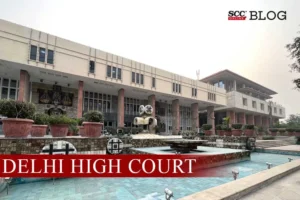Delhi High Court: Petitioner filed the present petition challenging the constitutional validity of the definition of the term ‘dealer’ as defined under Section 2(1)(j) of the Delhi Value Added Tax Act, 2004 (‘the DVAT Act’). Petitioner was aggrieved by the Explanation to Section 2(1)(j)(vii) of the DVAT Act, inasmuch as it also included any corporation or company engaged in commercial banking. The Division Bench of Vibhu Bakhru* and Amit Mahajan, JJ., opined that petitioner’s contention that it was not liable to pay tax on sale of goods on the ground that there was no value addition, was insubstantial. The Court thus rejected petitioner’s challenge to the constitutional validity of the definition of the ‘dealer’ as it was founded on ex facie erroneous premise.
Background
Petitioner was a scheduled bank, and its challenge was premised on the ground that the expansive definition of the word ‘dealer’ militates against the object of the DVAT Act. Petitioner submitted that the definition of the word ‘dealer’ was ultra vires Article 265 of the Constitution. Petitioner was aggrieved by the notices issued under Sections 32 and 33 of the DVAT Act by respondent, precisely, notice dated 23-08-2018 seeking to recover tax and interest amounting to Rs. 39,35,466 and penalty of Rs. 75,33,449 and notice dated 06-03-2019 seeking to recover tax and interest amounting to Rs. 94,09,083 and penalty of Rs. 1,79,71,806. The said notices were issued imposing liability of value added tax (‘VAT’) on petitioner as a dealer in respect of sale of re-possessed vehicles.
Analysis, Law, and Decision
The Court did not accept that the definition of the word ‘dealer’ falls foul of the Constitution and noted that Article 265 of the Constitution merely provided that no tax would be levied without the authority of law. The Court opined that the DVAT Act was an enacted law and there was no dispute that the tax sought to be collected was in terms of said law. Thus, any challenge on the ground that the definition of dealer was ultra vires of the Constitution would have to be sustained based on the same falling foul of any other provision of the Constitution.
The Court opined that the contention that the expansive definition of the term ‘dealer’ carries it beyond the scope of the DVAT Act was unpersuasive and it was necessary to read the object of the DVAT Act for its true meaning and import. The Court noted that the opening sentence of the preamble indicated that DVAT Act was an “Act to consolidate and amend the law relating to levy of tax on sale of goods, tax on transfer of property involved in execution of works contracts, tax on transfer of the right to use goods and tax on entry of motor vehicles by way of introducing a value added tax regime.” The Court opined that it was, thus, apparent that the object encompassed the law relating to levy of tax on sale of goods and right to use goods.
The Court noted that the provisions regarding imposition of VAT were contained in Chapter II of the DVAT Act and Section 3(1) of the DVAT Act expressly provided that every dealer, who was registered or was required to be registered under the DVAT Act, would be liable to pay tax calculated in accordance with the provisions of the DVAT Act. Thus, petitioner’s contention that the Scheme of the Act did not entail a charge on sale of goods, was erroneous.
The Court opined that the DVAT Act expressly provided for charge of tax on sale of goods subject to certain exemptions and adjustments and the scheme of DVAT Act did provide for credit for the taxes already borne to avoid the cascading effect of tax on sale of goods. However, it would be erroneous to assume that charge of tax was not on the sale of goods.
The Court opined that petitioner’s contention that it was not liable to pay tax on sale of goods on the ground that there was no value addition, was insubstantial. The Court thus rejected petitioner’s challenge to the constitutional validity of the definition of the ‘dealer’ as it was founded on ex facie erroneous premise.
The Court further opined that a dealer was required to pay VAT on its taxable turnover and it might be allowed credit of the taxes borne by the goods at an earlier stage, however, it was erroneous to suggest that the sale of goods was not chargeable to tax under the DVAT Act, if there was no increase or accretion in the value of goods by the dealer.
The Court relied on HDFC Bank v. Commissioner of Value Added Tax, Delhi, VAT APPEAL 29 of 2016, wherein Coordinate Bench of this Court followed the decision in Citi Bank v. Commissioner of Sales Tax, 2015 SCC OnLine Del 14023, and rejected an appeal against the decision of the VAT Tribunal holding that sale of such re-possessed vehicles was subject to the charge of VAT. The Court thus dismissed the present petition being unmerited.
[IndusInd Bank Ltd. v. State (NCT of Delhi), 2023 SCC OnLine Del 7885, decided on 05-12-2023]
*Judgment authored by: Justice Vibhu Bakhru
Advocates who appeared in this case :
For the Petitioner: Gunjan Kumar, Rajeev M. Roy, Advocates
For the Respondent: Dhananjaya Mishra, Navneet Dogra, Advocates

